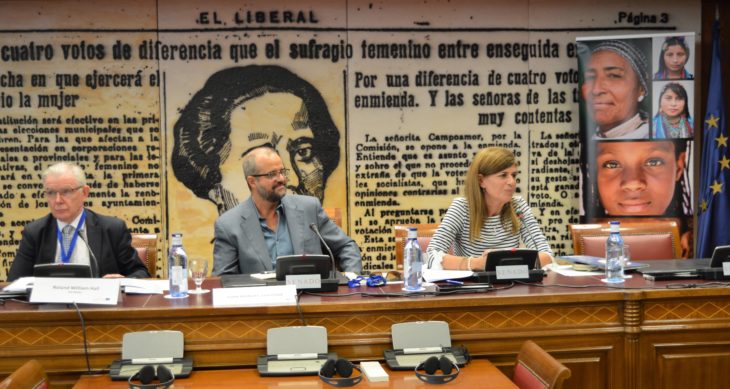Regional development acquires a new dimension: a territorial approach

An intense and fruitful discussion on regional development and territorial cohesion took place on 5 July, in the Spanish Senate’s iconic Clara Campoamor room in Madrid, when EUROsociAL – through its democratic governance area coordinated by FIIAPP – hosted a Forum for Dialogue on EU-CELAC cooperation in regional development, in collaboration with the European Union’s General Directorate for Regional and Urban Policy. The event attracted leading figures from government and representatives of these regions to address the state of play on this topic on political agendas in Europe and Latin America.
“Development is either inclusive or it is not development,” said Carla Fernández Durán of IADB-Europa, a point of agreement among those present, as the territorial level and development are now unquestionably associated. The event was divided into sessions and featured a number of interesting contributions reflecting on: the urgent need to rediscover territories and identities, as highlighted by Gianluca Spinaci, of the European Committee of the Regions; rebuilding a feeling of belonging, by Ronald Hall, principal advisor of the Directorate-General Regional and Urban Policy (DG Regio); territories as spaces for innovation, competitiveness and sustainable development; and the regional space as the ideal space for fostering changes in development models, enabling the region’s fiscal crisis to be overcome. The conditions for competitiveness can only be created from the territorial level, not the centre, according to Martín Guillermo, of the Association of European Frontier Regions, and Jaime del Castillo, of Infyde.
At a time when economic growth has stalled in Latin America, territorial cohesion is more essential than ever, but it needs new models to replace traditional approaches, with different ways of involving actors and managing public assets. As set out by Mario Pezzini, Director of the OECD’s Development Centre, this must be based on transparency, participation and negotiation about development projects and policies based on the territorial level.
From the point of view of social policies, programmes focussing on the territorial level are required, according to Francesco Chiodi, coordinator of EUROsociAL’s social policies, through the Instituto Italo-Latino Americano (IILA). The current crisis has generated new patterns of social exposure, and the territorial level is an excellent focal point from which to offer protection through inter-sectoral policies.
This approach may result in a particularly pertinent and timely approach to the new development agenda, connected with achieving the sustainable development objectives and an inter-sectoral approach to development, as set out by Javier Sánchez Cano, of the regional government of Catalonia. In summary, the forum highlighted the need for a territorial approach with a transversal perspective.
In this regard, the collaboration between EUROsociAL+ and DG Regio offers an ideal opportunity for progressing along this new path. Likewise, Senator Asunción Sánchez Zaplana, the spokesperson for the International Development Cooperation Committee, highlighted the importance of fostering the exchange of ideas between Europe and Latin America, to minimise territorial inequalities, through regional development processes.
To this end, EUROsociAL+ fosters alliances with bodies and institutions working in this field, many of which took part in the Forum. In addition to those we have already mentioned, these included: María Lahore of the CAF, Rosa Gómez of Madrid City Council, Germán Granda of DG Regio, Carmiña Albertos of the Inter-American Development Bank-Europe, Xoan Vázquez of Eixo Atlántico, Joaquín Olona of the regional government of Aragon, Jose María Pérez of SEAT Spain, Stefano Marani of Sign-net and Minister Alberto Amador Leal of SEDATU Mexico, which holds the presidency of the Latin American Network of Public Policies for Regional Development.
EUROsociAL+. Área de políticas de gobernanza / governance policies unit, FIIAPP



